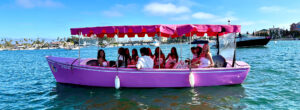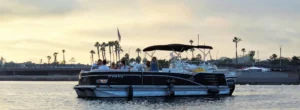Introduction
Heading out onto the water can be one of the most relaxing and enjoyable activities, whether you’re aboard a pontoon or steering through serene waters on an electric boat. However, ensuring safety while enjoying these leisurely pursuits is crucial. Water safety is fundamental to preventing accidents and ensuring a pleasant experience for everyone involved. This guide will provide you with essential tips for pontoon and electric boat rentals, helping you prepare adequately for a safe and enjoyable outing.
Understanding the basics of boat safety not only protects you and your passengers but also other boaters and aquatic life. As you get ready to embark on your next aquatic adventure, familiarizing yourself with these tips will ensure that every journey is as safe as it is fun.
Choosing the Right Life Jackets
Life jackets are the most critical safety devices for any boating activity. Ensure that there are enough life jackets for every passenger aboard, and that they fit correctly according to size and weight specifications. It’s vital that everyone wears their life jackets at all times while on the water, as most boating-related drownings involve individuals not wearing a life jacket.
For children, special attention is needed to ensure that life jackets fit snugly and cannot be easily removed. Regularly inspect life jackets for wear and tear and replace them if they are not in good condition. Remember, the right life jacket can be the difference between a minor accident and a fatal tragedy.
Even if you are an experienced swimmer, a life jacket is essential. Conditions on the water can change rapidly, and unexpected falls overboard can happen. The life jacket will help keep you afloat and visible until help arrives.
Understanding Local Boating Laws
Before you head out on the water, familiarize yourself with the local boating laws and regulations. These can vary widely depending on the location and type of waterway. Knowing the speed limits, right-of-way rules, and specific guidelines for the area is essential for maintaining safety and compliance.
Many areas require a boating safety certificate, which you can often obtain through a course that teaches the fundamentals of boat operation and safety. These courses are invaluable for new and experienced boaters alike, providing updated information on laws and safe boating practices.
Additionally, be aware of any licensing requirements for the operator of the boat. Ensuring that the person driving the boat is qualified and understands all operational aspects of the pontoon or electric boat is crucial for a safe trip.
Pre-Trip Safety Checks
Conducting a thorough safety check before departure is crucial. This includes checking the weather forecast to avoid any storms or high winds. Also, inspect the boat for any potential issues with the motor, hull, and other critical systems. Make sure all lights are working correctly if you plan to be out after dark.
Ensure that your boat is equipped with safety gear such as a fire extinguisher, flares, a first aid kit, and a whistle or horn. An anchor and rope should also be on board in case you need to stabilize the boat unexpectedly. These items can be lifesavers in emergency situations.
Check that you have a fully charged cell phone or a marine radio for communication. Inform someone onshore of your planned route and expected return time. This person can act as a point of contact and alert authorities if you do not return as scheduled.
Safe Navigation Practices
Navigating a boat safely requires awareness and consideration. Always keep a safe distance from other boats, swimmers, and objects in the water. Be particularly cautious in crowded areas to avoid collisions and ensure you are visible to other watercraft.
Understand and use navigational aids such as buoys and markers. These tools are placed to guide boaters safely around hazards and through channels. Using a GPS device can also help in unfamiliar waters, ensuring you stay on course and can find your way back if needed.
For pontoon and electric boats, it’s especially important to be aware of the boat’s draft and height. These boats are often larger and sit higher in the water, which can affect how they handle and navigate through tight spaces or under bridges.
Guest Safety Briefing
Before setting out, hold a brief safety meeting with all your guests. Explain where the safety equipment is stored and how to use it. Demonstrate how to properly wear life jackets and what to do in the event of an emergency, such as a man overboard or the need to evacuate the boat.
Discuss the importance of keeping hands and feet inside the boat at all times and staying seated while underway. Sudden movements can destabilize smaller boats, leading to accidents. Establish and communicate clear rules regarding alcohol consumption, as impairment can significantly increase the risk of accidents on the water.
Encourage questions and ensure that everyone feels comfortable with the information provided. A well-informed crew and passenger group are key components of a safe boating trip.
Alcohol and Boating
While enjoying a day out on the water might seem like a perfect opportunity to crack open a beer or two, alcohol significantly increases the risk of accidents. The operator of the boat should avoid consuming alcohol entirely, as it impairs judgment, balance, and the ability to operate the boat safely.
If guests choose to drink, it should be in moderation. Ensure there are plenty of non-alcoholic beverages available and that everyone stays hydrated, especially on hot days. Alcohol can exacerbate dehydration and sun exposure effects, leading to serious health risks.
Remember, the primary responsibility of the boat operator is the safety of all passengers. Maintaining sobriety is a critical aspect of ensuring that everyone enjoys the trip without incident.
Environmental Considerations
Responsible boating includes protecting the environment you’re enjoying. Be conscious of wildlife and their habitats. Avoid areas where you might disturb nesting birds or sensitive marine environments. Keep a safe distance from marine animals and observe them without chasing or feeding.
Dispose of all waste properly. Never throw garbage, food, or other items overboard, as this pollutes the water and can be harmful to aquatic life. If you see trash in the water, consider retrieving it if safe to do so.
Use eco-friendly products for cleaning and maintaining your boat. Harsh chemicals can damage the water ecosystem. Opt for biodegradable soaps and cleaners that are less harmful to the environment.
Conclusion
Boating is a delightful way to spend time with friends and family, enjoying the beauty of nature from the water. Following these essential safety tips for pontoon and electric boat rentals will help ensure that your time on the water is not only fun but safe for everyone involved. Always prioritize safety over convenience, prepare thoroughly, and respect both maritime laws and environmental guidelines. With the right preparations, your boating experience can be enjoyable and incident-free, leaving you free to create lasting memories on the water.
Excited for an adventure with us or have a question? Call us at: (949) 675-8433 Book Your Ride with us: Click here to Book


